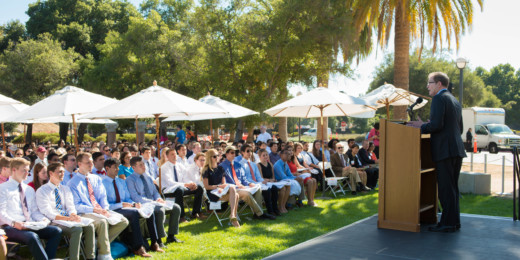There is a saying among students that medical education is like “taking a drink out of a fire hydrant.” The simile evokes the torrent of information and the impossibility of taking it all in.
The type of people who are admitted to medical school aren't used to being wrong; to call them perfectionists wouldn’t be too far from the truth. Many secured a seat in medical school because they had made a habit of being right — from assignment to quizzes to final exams to standardized tests.
I’d struggled as a college freshman before syncing my study habits to the challenge of college, and I expected that adjusting to medical school would be a similar experience. However, the sheer volume of information in the classroom was overwhelming — from learning about the characteristics of smallest viruses to the big-picture causes of health disparities.
Fortunately, the Stanford curriculum intentionally fostered a collegial atmosphere. My brilliant classmates freely shared their resources, knowledge and encouragements.
The pressure to do well in medical school was almost entirely internal, based on a desire to be a competent physician. While my grades were satisfactory, I worried that any gap in my knowledge — anything short of perfection — would prevent me from taking care of my patients.
The task of learning grew more Sisyphean during the third year of medical school.
For one or two months, students rotate through internal medicine, surgery, psychiatry, neurology, pediatrics, family medicine, ambulatory medicine, and critical care. In our brief forays into these specialties, we would immerse ourselves in the day-to-day nuances of each field, learning under residents and attendings who had been practicing their craft for years, if not decades.
Moreover, after two years of learning in the classroom, I was assigned patients to manage. I wanted my patient plans to be perfect and to answer every teaching question correctly. To this end, I studied my patients’ conditions, read textbooks and recently published research papers, and thought about how my residents and attendings would quiz me.
But time and time again, it was impossible to get everything correct, and even the best-laid plans could not ensure that the patient would get better. The impossibility of the task I had placed on myself manifested in sleepless nights, stuttered presentations, and ever-present dread that I wasn’t doing enough for my patients or my education.
In my second rotation, an attending noticed my distress during bedside rounds when I answered a question incorrectly. He told me, “Embrace being wrong. That way, you can start learning what’s right.”
I committed his advice to heart, and it was in this impossible situation where I realized that the goal of third year wasn’t to be correct. Instead, the goal was to start building my clinical reasoning under the auspices of my watchful interns, residents, and attendings, who would check my work, edit my plans, and point me in the right direction.
Unfortunately, one realization couldn’t do much to reverse more than two decades of chasing perfection, and I continued to be more critical of myself than I should have been. However, I became less self-conscious about presenting my plans; I began to embrace the clinical challenges and the corrections offered by physicians.
The unbearable heaviness of being wrong dissipated into a lightness of knowing that I was allowed — even encouraged — to be wrong, as long as I was always striving to be better.
Throughout the rest of third year, regardless of the specialty, my preceptors always noted my readiness to improve. At this point in my training, being a physician was never the objective; the goal was becoming one.
My rigid insistence on perfectionism had detracted from my education, but my desire to improve allowed me to learn and to shine in the eyes of my evaluators. There would be a time where I would take on the sole responsibility of taking care of patients, but today wasn’t that day.
And I would be okay.
Stanford Medicine Unplugged is a forum for students to chronicle their experiences in medical school. The student-penned entries appear on Scope once a week during the academic year; the entire blog series can be found in the Stanford Medicine Unplugged category.
Yoo Jung Kim is a fourth-year Stanford medical student and the co-author of What Every Science Student Should Know, a guide for aspiring college STEM students. She also writes for Doximity and U.S. News and World Reports.
Photo by Gades Photography






